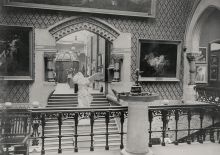Archives and Special Collections
The archives and special collections serves as the institutional memory of the Pennsylvania Academy of the Fine Arts (PAFA). We identity, acquire, and maintain records of enduring value that documents the key activities and experiences of the PAFA community since our founding in 1805.
The scope of the collection includes:
- Minutes of the board and its committees; information on founders, board members, stockholders, and the Pennsylvania Academicians.
- Annual Reports, Charter, by-laws, legal papers, and financial reports.
- Office files of the administrators, curators, deans.
- Clipping files, scrapbooks, and press releases.
- Student records; school catalogs; faculty minutes; information on faculty.
- Exhibition catalogs and records of PAFA's exhibitions from 1807 to the present.
- Photos of exhibitions, school activities, events, buildings, artists, and administrators.
- Manuscripts, correspondence and personal papers of artists, collectors, and art organizations.
An essential resource for scholars, students, curators, conservators, writers, journalists, artists, and Museum staff, the Archives plays a crucial role in fulfilling PAFA’s mission as an educational institution.
Hours and Visitation Polices
| Monday–Friday | Appointment only |
| Saturday-Sunday | Closed |
The archives are closed Federal Holidays. Hours are subject to change.
Due to limited seating capacity and staff, all visits to the Archives at PAFA are by appointment only. Appointments must be made by email only.
- Appointments must be submitted online 1-2 weeks in advance.
- Researchers must provide a description of their research project with their appointment requests.
Collection Policy
The Pennsylvania Academy of the Fine Arts, founded in 1805, is the oldest art museum and school in the United States. The records in its Archives were accumulated as a result of the Academy's two primary activities: collecting, preserving, and exhibiting art, and training artists. An important research facility, the Academy's extensive archives document not only the history of the institution, but the development of the fine arts and art education in America.
The Archives’ holdings primarily consist of institutional documents (papers, files, and publications) created by members of the PAFA community and maintained by the Archives as a record of the Institution’s activity. Our archival collection includes: papers, documents, electronic files, photographs, videos, cassettes, financial records, letters, and personal materials relating to PAFA. Materials in the Archives are housed in secure, temperature-controlled environments.
In order to carry out its mission to acquire materials of enduring value for preservation and access, the Archives collects the following types of records:
- Non-current records of administration, academic departments and student activities: Records which are no longer of immediate routine use and that document the everyday functions of the Institution.
- Official publications, including newspapers, newsletters, yearbooks, directories, pamphlets, advertisements, posters, and notices.
- Blueprints and information about PAFA’s campus and buildings.
- Clippings and photographs related to PAFA: News accounts, including photography, that record important events at PAFA or are created by PAFA’s communications department.
- Faculty publications: Books, articles and other published material by faculty who are teaching at the time of the publication.
- Student theses and dissertations.
- Photographs, scrapbooks and memorabilia that document the PAFA student experience.
- Records generated by affiliated organizations.
- Records of select Philadelphia art organizations.
- Papers of American artists associated with the Academy or of significance to American Art history.
The Archives acquires material primarily through donation from departments of the Institution and from alumni, students and interested members of the community.
We're so excited you're planning to visit PAFA!
Make time for art — visit us Thursday to Sunday.
Before reserving your tickets, please review helpful information about museum hours, accessibility, building access, and special admission programs.
If you have any questions, feel free to reach out to us at visitorservices@pafa.org — we’d love to help!
